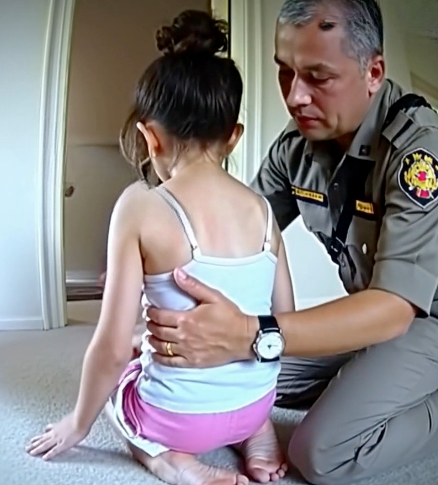There are certain moments in life that imprint themselves so deeply into your memory that even years later, every detail remains vividly intact. For me, one of those moments occurred on a quiet Sunday afternoon, just as sunlight was beginning to soften across the living room carpet. My seven-year-old daughter, Sophie, had just returned from her mother’s home, but something about her posture, her silence, and her hesitant movements instantly told me that something was different.
Sophie’s personality had always been bright and lively. She was the kind of child who skipped instead of walked, who hummed little melodies while brushing her teeth, and who viewed the world with limitless curiosity. Her eyes, usually filled with excitement and mischief, carried a subdued heaviness that I did not recognize.
As a parent, especially one who works in public service, you learn to identify subtle signs. I’ve spent years reading the emotions of strangers—learning when someone is hiding stress, discomfort, or unspoken concerns. But nothing prepared me for seeing these signals reflected in my own child.
When Sophie stepped inside, she didn’t run to her usual routines. No sudden request for snacks, no excited recap of her weekend adventures, no display of the crafts she usually brought home. Instead, she walked slowly, clutching her backpack strap with both hands.
“Daddy,” she said quietly, “I need to be stronger.”
There was something in her voice—a softness that didn’t match her words. I set her bag down gently and knelt so we were eye-to-eye.
“Stronger for what, sweetheart?” I asked, trying to keep my voice relaxed.
She shrugged, eyes drifting downward. “Just stronger,” she whispered.
I didn’t press her immediately. Children open up best when you give them space. I helped her remove her jacket, but she winced—just slightly, but enough for me to notice. It wasn’t a dramatic reaction. Just a small, involuntary flinch that told me something was making her uncomfortable.
“Hey,” I said softly, “are you feeling okay?”
She hesitated, then whispered, “My back hurts a little.”
I kept my tone light. “Did you trip while playing? Or maybe fall while climbing something?”
She shook her head. “No… it’s from the practice.”
That word—practice—was vague, but meaningful. I took a slow breath.
“What kind of practice, Sophie?”
She looked toward the floor again, tracing shapes on the carpet with her toe. “Nathan says I need to be tougher. He says it’ll help me when I grow up.”
Nathan, of course, was her stepfather—my ex-wife’s new husband. He and I had always had cordial, if not exceptionally close, interactions. He was confident, structured, often talking about the importance of discipline. Our parenting styles differed, but so do many parents’, and normally, adults find middle ground.
But something about Sophie’s tone didn’t feel like normal.
A Gentle Conversation
I didn’t want to alarm her, so I kept my voice calm.
“You know,” I told her, “becoming strong can mean a lot of things. Being patient, being kind, trying your best. Did someone tell you that you need to change something?”
She bit her lip. “Nathan says I need to learn to carry heavy things. And that timing myself helps me learn responsibility. He said Mommy thinks I should try harder at things even when they’re difficult.”
The words themselves weren’t alarming—but the way she said them was. Her posture drooped, as though the expectations placed on her were too heavy for her small shoulders.
“Sophie,” I said gently, “did you tell anyone that it makes you uncomfortable?”
She shook her head. “I didn’t want anyone to think I’m not good at things.”
That sentence pierced me more deeply than anything else. Children shouldn’t feel the weight of adult expectations—not like that, not at seven years old. They should feel supported, encouraged, and guided, not unsettled or unsure of their worth.
I asked, still in a calm tone, “Does Nathan help you when you’re struggling?”
She answered honestly, “He says I should learn to finish things by myself. He says it’s how strong people grow.”
I nodded slowly, and hugged her gently. “Sweetheart, strength doesn’t come from pressure. It comes from knowing you’re supported.”
Next Steps Toward Understanding
Since she mentioned discomfort, the first thing I did was schedule a routine wellness check. Not because I leapt to any dramatic conclusions—but because any responsible parent would want to ensure their child’s physical and emotional well-being. Her doctor examined her with care, noting mild muscle strain consistent with carrying objects too heavy for her age.
Nothing dangerous. Nothing alarming. But enough to confirm she had been physically pushed beyond what was appropriate for a young child.
I explained the importance of proper boundaries, age-appropriate activities, and emotional reassurance. The doctor nodded in agreement and provided a written overview in case we needed to further examine the situation.
Evidence is not always about wrongdoing—it is often about clarity.
Speaking With My Ex-Wife
Conversations between co-parents can be delicate. When I called Laura, I approached the discussion with caution, not accusation.
“Hey,” I began slowly, “I want to talk about something Sophie mentioned.”
Her tone was neutral. “Is everything okay?”
“She said she’s been doing some kind of physical practice at your place. Carrying things, timing things.”
“Oh,” she said, “Nathan has been helping her build resilience. He says she needs to challenge herself more. She’s getting older.”
I hesitated. “I understand wanting to teach her responsibility. But the expectations might be too demanding for her age. She seems overwhelmed.”
There was a pause. “Nathan believes in structure. He says it builds confidence. Maybe she’s just misinterpreting things.”
I stayed calm. “She’s expressing discomfort. I think it would help if we talked openly about what kinds of activities she’s being asked to do and whether they’re appropriate.”
Laura’s voice shifted slightly, becoming defensive. “Nathan’s just trying to help. You’re always so gentle with her that sometimes she struggles when she faces challenges. He thinks she needs to be pushed a bit more.”
“I don’t think pushing is the right word for a seven-year-old,” I replied calmly. “Encouraging, coaching, supporting—yes. But ‘pushing’ her shouldn’t leave her feeling unsure of herself.”
The call didn’t end in complete agreement, nor did it escalate into conflict. We were simply two parents with different perspectives trying to navigate a sensitive situation. What mattered most was that I remained intentional about supporting Sophie without creating unnecessary tension.
A Father’s Commitment
As a parent, my first duty is not to my pride, or my frustrations, or even my assumptions—it’s to my daughter’s emotional security. Children flourish when they feel heard, valued, and safe in expressing their concerns.
That night, after her warm bath and quiet dinner, Sophie finally returned to her usual self. She asked to draw pictures in her sketchbook, and together we filled pages with imaginative scenes—castles, kittens, and star-filled skies.
Dinner meal kits
I watched her draw with a quiet relief, knowing that sometimes children simply need reassurance to regain their confidence.
I didn’t lecture her about what she said earlier. I didn’t ask more questions. I just supported her, offering peace after a weekend that had clearly left her feeling uncertain.
A Deeper Reflection on Parenthood
Parenting, I’ve learned, is rarely a straight line. Everyone has different philosophies. Some believe in strict routines, others in gentle guidance, and many fall somewhere in between. What matters most isn’t the style itself—it’s whether the child feels secure, loved, and supported within it.
Strength is important. But so is balance. Resilience grows best in an environment where expectations are realistic and children are given time to grow at their own pace.
A child should never feel like they must earn love by performing tasks. They should feel valued simply for being who they are.
As a father, and as someone who has seen countless family dynamics through my professional work, I know how delicate these situations can be. They require patience, collaboration, and—above all—understanding.
Moving Forward With Care
In the weeks that followed, I chose a path rooted in cooperation. I reached out to Laura again, suggesting that we work together to find activities that encouraged Sophie’s development without causing her emotional strain.
Things like:
- age-appropriate chores
- fun, structured physical activities like dance or sports
- teamwork-based games
- cooperative problem-solving challenges
- creative outlets that build confidence
Laura agreed to try a gentler approach. Nathan, after some discussion, also adjusted his expectations, realizing that children respond far better to positive reinforcement than to pressure.
We collectively agreed that our daughter’s emotional well-being was more important than any single viewpoint about discipline or responsibility.
The Result: A Brighter, More Confident Sophie
Over time, the difference was noticeable.
Sophie began returning from her mother’s house with stories of baking cookies, working on puzzles, and practicing new skills without feeling overwhelmed. Her confidence grew naturally—not from being pushed, but from being encouraged.
With patience, communication, and teamwork, our co-parenting dynamic transformed into something healthier and more supportive for her.
A Father’s Promise
Looking back on that day—the quiet Sunday afternoon when she walked through my door with uncertainty in her eyes—I now understand how crucial that moment was. It became the catalyst for a deeper commitment to her well-being and a more unified parenting approach between all the adults in her life.
No matter how households differ, no matter how parenting styles may clash, one principle remains true:
A child’s emotional safety must always come first.
My promise to Sophie is simple:
- I will always listen.
- I will always support her growth.
- I will always be her safe place.
- And I will always stand beside her as she becomes strong in the ways that truly matter—kindness, resilience, confidence, curiosity, and joy.
She doesn’t need pressure to grow.
She just needs love, guidance, and people who believe in her.
And that’s something she will never have to question again.



